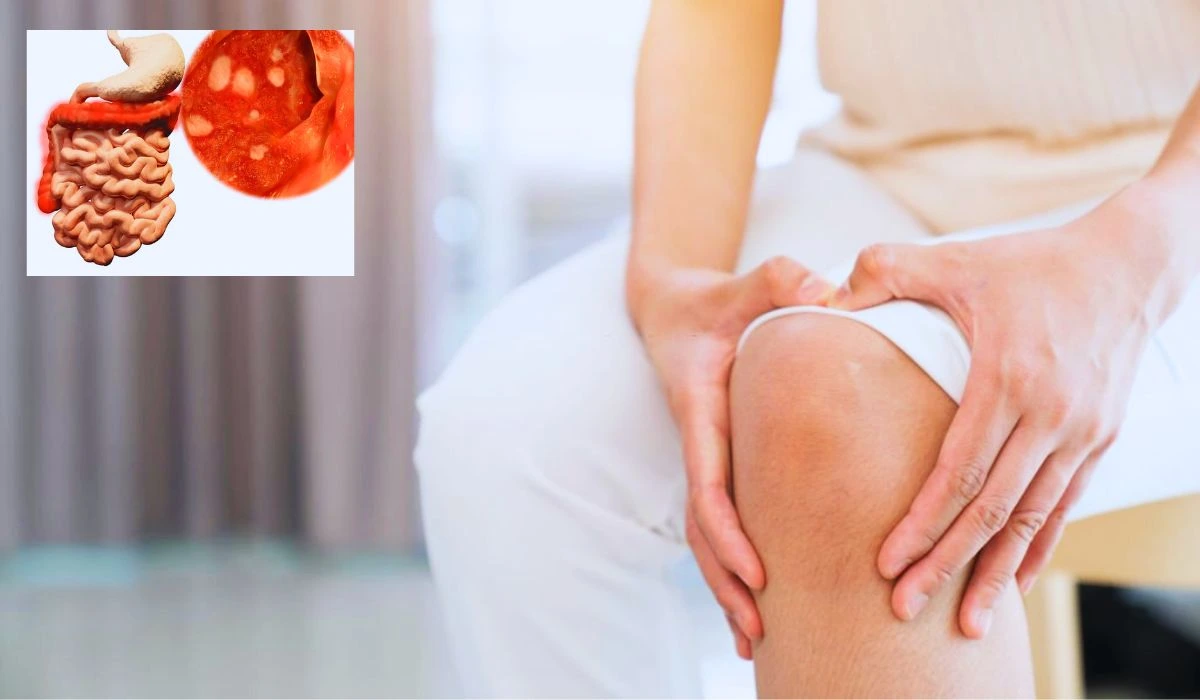Ulcerative colitis is a type of inflammatory bowel disease that causes inflammation and ulcers in the digestive tract. It can lead to abdominal pain, diarrhea, rectal bleeding, and other symptoms. In addition to digestive issues, some people with ulcerative colitis also experience joint pain. This article explores the link between ulcerative colitis and joint problems, the causes, and potential treatments.
What Is Ulcerative Colitis?
Ulcerative colitis is a chronic condition that causes inflammation and ulcers in the inner lining of the large intestine (colon) and rectum. It is one of the two main types of inflammatory bowel disease along with Crohn’s disease. The exact cause is unknown, but it likely involves an overactive immune response to gut bacteria.

The inflammation from ulcerative colitis can damage the colon and lead to symptoms like:
- Diarrhea, often with blood or pus
- Abdominal pain and cramping
- Rectal pain and bleeding
- Fatigue
- Reduced appetite and weight loss
- Fever
The symptoms usually flare up and go into remission periodically. Medications can help control inflammation and prevent symptom flare-ups.
Is There Any Connection Between Ulcerative Colitis And Joint Pain?
Yes, many people with ulcerative colitis also experience joint pain and inflammation. This is known as a type of arthritis called peripheral arthropathy that is associated with inflammatory bowel disease.
Studies show that up to 30% of people with ulcerative colitis also develop this joint pain and swelling. Any joint can be affected, but it most often occurs in the knees, ankles, wrists, elbows, and fingers. Usually, only a few joints are painful at a time.
The joint symptoms are caused by inflammation outside of the intestines. It is an extra-intestinal manifestation of the abnormal inflammatory response of the immune system that underlies ulcerative colitis. The same immune system reactions cause both digestive issues and joint problems.
Also Check: What Causes Stiff Joints? How To Treat Them Effectively?
How To Treat Joint Pain Caused By Ulcerative Colitis
If you have joint pain related to ulcerative colitis, there are several treatment approaches:
- Treat the underlying inflammation – Getting the colitis under better control by reducing intestinal inflammation can also calm down the immune response and improve joint pain. Medications like aminosalicylates, steroids, and biologics work systemically.
- NSAIDs – Non-steroidal anti-inflammatory drugs like ibuprofen can relieve mild joint pain. But they may worsen intestinal inflammation.
- DMARDs – Disease-modifying antirheumatic drugs like sulfasalazine and methotrexate can reduce immune system activity.
- Biologics – Drugs that target specific parts of the immune response, like infliximab, adalimumab, and golimumab. They are effective for both colitis and joint issues.
- Physical therapy – Stretching, strengthening exercises, and hot/cold therapy can help manage joint pain and improve function.
- Surgery – For those with severe joint damage, procedures like synovectomy or joint replacement may be options.
Getting plenty of rest during flares, using joint braces, and avoiding high-impact activities can also help reduce discomfort in painful joints. Work closely with your gastroenterologist and a rheumatologist to develop the best treatment plan for your individual symptoms.
Conclusion
Many people with ulcerative colitis experience joint pain and swelling as an extraintestinal manifestation of the condition. It is caused by the overall immune system inflammation underlying ulcerative colitis.
Treatment involves medications that reduce immune reactions, like aminosalicylates, biologics, DMARDs, and sometimes joint surgery. Managing both digestive symptoms and joint issues is important for improving comfort and quality of life.
FAQ
A: The knees, ankles, wrists, elbows, and fingers are most commonly affected, but any joint can develop pain and inflammation.
A: Yes, medications that control intestinal inflammation and immune response, like aminosalicylates and biologics, often also reduce joint symptoms.
A: It can be temporary during flares, chronic, or come and go. Controlling intestinal inflammation helps minimize joint problems.
A: NSAIDs, DMARDs like sulfasalazine and methotrexate, and biologics such as infliximab and adalimumab can all reduce joint inflammation.
A: See a rheumatologist if your joint symptoms do not improve with ulcerative colitis treatment or if they significantly impact your daily activities.

